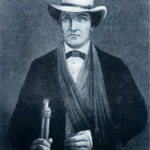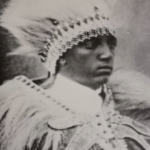DAGADU III
- 2 Min Read
Dagadu III (18?-1925), also called Anku Dagadu, was chief of Kpandu, (an Ewe town on the left bank of the Volta River about 90 mi [144 km] inland in what was the German colony of Togo, and is now the Volta Region of Ghana), under both German and British rule. A strong opponent of German colonial rule, he was deported by the Germans in 1911, but was reinstated as chief by the British after the defeat of the German forces in West Africa in World War I (1914-18).

PHOTO CAPTION: Dagadu III. SOURCE: togoarchives.com
Dagadu succeeded his brother as fia (chief) of Kpandu in 1897, the year the German colonial administration established an administrative post at Kpandu. He was one of the most important chiefs of the region, as his jurisdiction covered an extensive area. It was said of him that he was the first chief in German-ruled Ewe territory to wield effective power over his subjects since the sub-chiefs in the Kpandu region were entirely under his control. Because of his forceful personality, he came into conflict with the colonial authorities.
He objected to various aspects of the German administration, and especially to the curtailment of his traditional authority. In 1903 the German administration made a number of villages which had traditionally been under Kpandu rule independent of it. This reduced Dagadu’s status to that of a sub-chief in the neighbouring Gold Coast, on the opposite (right) bank of the Volta. He resisted this change and continued to hear lawsuits from these villages.
Short of open defiance, he took every action he could to oppose the German authorities and to identify himself with attempts to interest the Gold Coast government in that area of Togo. He was accused of communicating with the chief of Peki, a town some 30 mi (48 km) to the southwest, in Gold Coast territory, and was therefore deported by the Germans to their colony of Kamerun (now the Republic of Cameroun) in 1911.
He was brought back by the British shortly after their military occupation of both Togo and Kamerun in 1915. He was reinstated as chief under the British mandate, and died in 1925.
E. K. AMENUMEY




